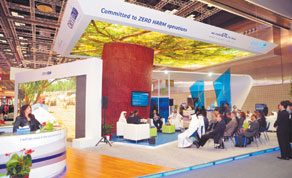 |
| An Oryx GTL Majlis at the company’s pavilion at the World Petroleum Congress here |
Since starting commercial production in 2007, ORYX GTL – a $1bn joint venture between Qatar Petroleum and South Africa’s Sasol - has exported more than 20mn barrels of premium GTL products, sold initially on the spot market and subsequently on three- to six-month term contracts.
The company’s ‘broad-brush’ approach to GTL sales maximises product availability to a diverse base of clients who seek high-performance, low-emission diesel and high-grade naphtha.
Oryx GTL’s sales strategy is underpinned by reliable output from its state-of-the-art complex in Ras Laffan, which has a total GTL output capacity of around 34,000 barrels per day.
Speaking at the Oryx GTL Majlis Series at the World Petroleum Congress, Gary von Berg, marketing manager said: “A decision was made early on that we would allow as many buyers as possible to access the products, thereby setting the platform for Oryx GTL to pioneer the development of, and interest in these products in the market place, and start positioning Qatar as the world’s GTL capital.”
Nafal al-Hajri, head (Sales) at Oryx GTL said: “The majority of the GTL diesel is currently sold to Europe as originally anticipated, while GTL naphtha is being supplied to customers in India, Malaysia and Japan.”
Oryx GTL is helping drive the development of a vibrant, innovation-led community of companies in Qatar who leverage the country’s abundant natural resources to manufacture high-specification products increasingly coveted globally.
As well as being a global GTL pace-setter, Qatar is a long-standing and dominant force in the global liquefied natural gas (LNG) market, helping power Asian economic growth as well meeting demand from more mature yet highly regulated European markets.
A successful hydrocarbons-based industry is a key component of Qatar’s long-term national economic and social development vision.
The sector is also a pillar of the economy, which is expected to grow by 19% in 2011, the fastest in the world for the second consecutive year, according to the International Monetary Fund (IMF).

